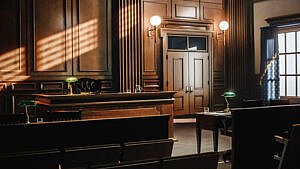Carteret County, North Carolina courts take domestic violence charges seriously in all areas including Beaufort and Morehead City. A conviction for this crime will have lasting consequences on your freedom. And that’s saying nothing of your reputation, which will almost certainly suffer. But remember, an arrest is not a conviction, and you are entitled to a fair trial and presumption of innocence.
An aggressive criminal defense attorney can improve the likelihood of an acquittal. Hancock Law Firm, PLLC represents defendants who have been charged with domestic violence crimes. If you’re facing charges, we can help.
How Does North Carolina Define Domestic Violence?
It’s a common misconception that domestic violence only includes physically striking another person. In reality, the law in North Carolina is substantially broader than that. While intentionally causing injury to another person certainly meets the definition of “domestic violence,” so is attempting to do the same. The law also includes making threats and putting the other person in fear.
Specifically, you could be charged if you are accused of any of the following:
- Causing bodily injury
- Attempting to cause bodily injury
- Placing the other person, or a member of that person’s family or household, in fear of imminent bodily injury
- Sexual assault
- Conduct that torments the other person
- Stalking
You could be charged with a wide range of crimes, including:
- Simple assault
- Assault on a female
- Communicating threats, and others.
Because the state’s domestic violence laws are defined so broadly, a person could be charged for something he or she didn’t even realize is illegal.
Who Is Protected By North Carolina’s Domestic Violence Laws?
Another misunderstanding is that these laws only protect spouses. As defined, the laws cover several different personal relationships, including:
- Spouses and ex-spouses
- People who are in a romantic relationship
- People who are dating or previously dated
- People who have a child together
- Parents and grandparents
- Current or former roommates
How Do Courts Handle Domestic Violence Accusations?

If someone goes to a judge and accuses you of domestic violence, there’s a good chance the court will issue an emergency protective order. Because of the nature of domestic violence, legislators recognize that there are legitimate emergencies in which a victim’s life could be put in jeopardy by an assailant. The emergency protective order is temporary, usually lasting no more than ten days. A full hearing will later be held to determine whether to put in place a longer protective order. However, any violation of an emergency order – which generally prohibits the accused individual from contacting the other person – can result in an arrest.
Domestic violence also comes up in civil proceedings, with similar steps. A divorcing party, or one fighting over custody, may allege domestic violence and obtain a temporary protective order. Although these orders are civil, violating their terms can also result in an arrest.
Conviction of criminal domestic violence after a full hearing will cause the court to issue a protective order that has more lasting consequences. In addition to ordering the convicted party to keep away from the accuser, this order can also:
- Give possession of the residence to the accuser
- Give the accuser temporary custody of a child
- Prevent you from visiting places where the accuser may be, including his or her place of employment
- Order you to pay child support or spousal support
- Order you to turn in any firearms you own
Protective orders are valid for up to one year, after which they may be extended.
Criminal Penalties
Some charges are misdemeanors, while others are felonies. Not only could you be facing jail after your initial arrest, but a later conviction could result in prison time. Probation and anger management classes are also common.
The severity of your punishment will depend on several factors, including prior criminal history and the seriousness of the alleged injuries. The particular judge in your case may also have a reputation as being tough on domestic violence. Remember, too, that violating any protective order (e.g. by trying to contact the victim) will likely result in jail time.
What Are Possible Defenses?
While domestic violence is a serious problem, the statutes are frequently abused by jealous or vengeful ex-spouses and partners. Angry or hateful comments are often twisted into “threats,” and many accusations boil down to he-said/she-said. In family law cases, spouses or ex-partners sometimes allege abuse to gain an advantage in custody or divorce proceedings.
These charges are sometimes made in the heat of an argument or because of a sudden change of heart. For that reason, an accuser’s conduct leading up to or immediately after charging domestic violence can be revealing. There may be text messages between you and the other person which demonstrate no violent or threatening behavior. Other witnesses may have been present who can testify in your defense. There might even be video or photo evidence contradicting charges that you committed or threatened violence.
Contact Our North Carolina Domestic Violence Attorney
An experienced domestic violence defense attorney will thoroughly examine all available evidence, uncover additional evidence which may exonerate you, and explore all potential defenses. That’s the sort of representation that you can expect from Hancock Law Firm, PLLC. If you’ve been accused of committing a domestic violence crime in North Carolina, don’t wait to take action. Give us a call to schedule your confidential consultation today.

